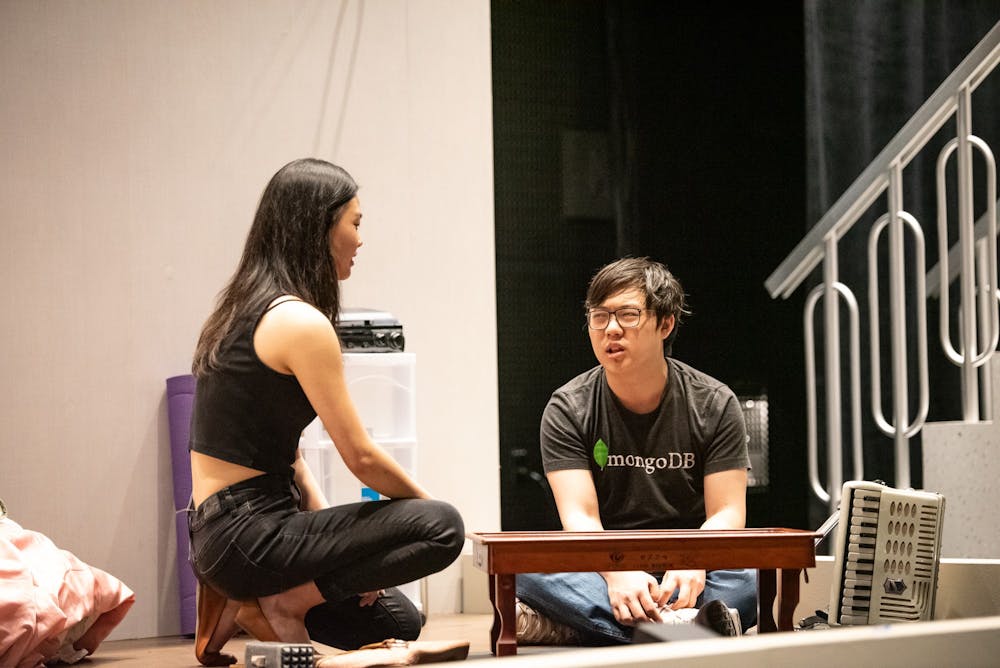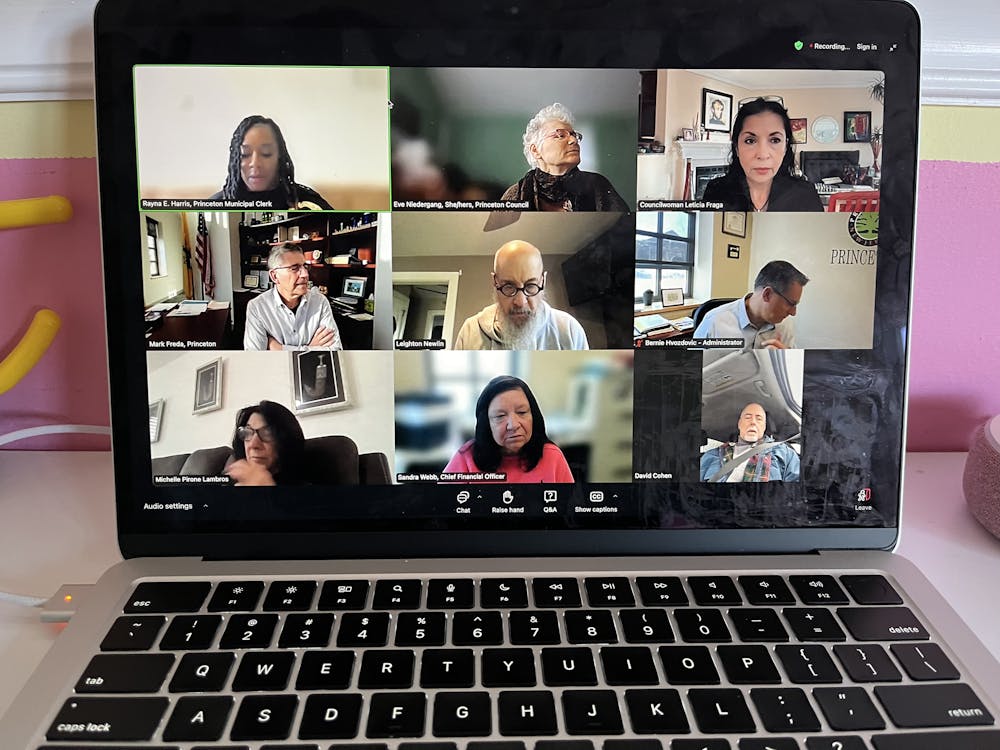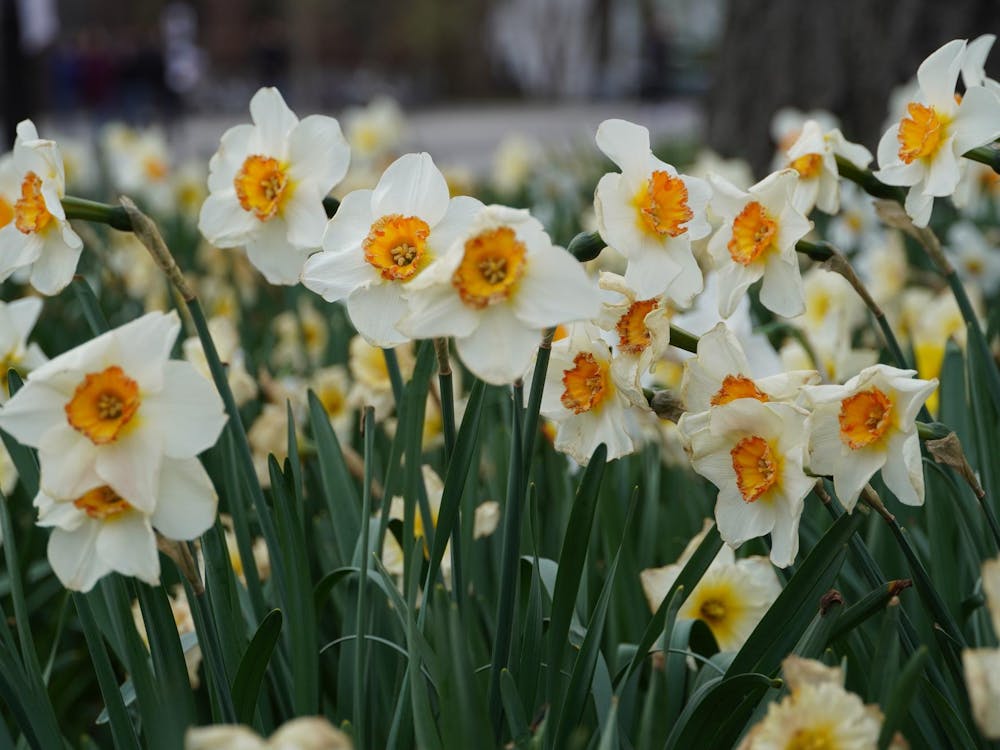The Lewis Center for the Arts’ Program in Theater will present the first full English-language production of “Sister Mok-rahn,” a critically acclaimed contemporary Korean play written by Eunsung Kim and translated by Dayoung Jeong. The production is the senior thesis project of Jenny Kim ’20, who provided dramaturgy, lighting design, and set design, while Carol Lee ’20 plays the title character, Jo Mok-rahn.
The production is co-produced with East West Theater and in collaboration with Princeton North Korean Human Rights (PNKHR). It is also co-sponsored by the Department of Comparative Literature and the Korean Language Program.
“Sister Mok-rahn” follows Jo Mok-rahn, a North Korean defector to South Korea and accordion player from Pyongyang who wishes to return to North Korea and her parents. In an effort to raise money for the trip, Mok-rahn becomes the caretaker of Huh Tae-sahn, an unemployed historian suffering from depression. Mok-rahn soon becomes caught up in the lives of Tae-sahn’s mother Joe Dae-jah, who runs a brothel; brother Huh Tae-gahng, who teaches philosophy; and sister Huh Tae-yang, who gave up writing novels for writing films. Romance and conflict arise as Mok-rahn attempts to navigate the capitalism and culture of South Korea in order to return home.
Originally commissioned by the Doosan Art Center in Seoul, South Korea, “Sister Mok-rahn” premiered there on Mar. 9, 2012, and it has since received several productions in South Korea. Jeong translated the play as her thesis through the Columbia MFA Dramaturgy program, and her translation was performed in May 2017 as a reading at the Nuyorican Poets Café in New York City as part of the PEN World Voices: International Play Festival.
Jenny Kim discovered the play when working on a final paper for a course on Korean literature. While searching for Korean theater in translation, Kim found that few Korean plays had been translated into English. “Sister Mok-rahn” was accessible because it had been written as an academic paper and a full recording of the reading was available on YouTube.
Jenny Kim immediately thought Carol Lee would be perfect for the role of Mok-rahn. The two seniors met during their first year at Princeton while working on Theatre Intime’s Student Playwrights Festival, which marked the first time Carol Lee acted in a play and the first time Jenny Kim designed lighting for a production.
“It kind of came full circle from freshman year, [when] as a senior, she [Jenny Kim] was like, ‘I just found a Korean play, and I really think it should be you who is doing it with me,’” Carol Lee said.
Jenny Kim brought the idea of doing a full production to Jeong who then reached out to the playwright, Eunsung Kim, and both gave their consent. Jenny Kim then helped secure professional artist Seonjae Kim, the director of the 2017 reading, as director of this production.
Other professional collaborators include costume designer Hahnji Jang, sound designer Fan Zhang, and fight and intimacy choreographer Rocio Mendez.
When approached by Jenny Kim, Seonjae Kim said there was no question she wanted to be a part of the Lewis Center production.
“I direct a lot of readings, and some readings you kind of do it for one day and then it’s over, but this one kind of stuck with me because it’s a play from my home,” said Seonjae Kim, who is from South Korea. “And not only is it a Korean author, but it’s really a play about Korea and about North Korea and Korean society.”
In order to address the contextual and dramaturgical needs of the play, the project team has organized several workshops and events to facilitate dialogue around the play. East West Theater will moderate a series of three talkbacks cosponsored by Princeton’s Campus Conversations on Identities (CCI) Fund: on Feb. 15 with Seonjae Kim and Jeong; on Feb. 20 with Seonjae Kim, Jenny Kim, and Carol Lee; and on Feb. 21 with Dan Chung (senior analyst and founder of Crossing Borders, an organization that helps North Korean refugees and their children living in China) and Ken Eom (a North Korean defector). Both Chung and Eom will be speaking at the PNKHR 2020 Intercollegiate Conference the following day. Titled “Facade,” the conference will take place in Whig Hall from 10 a.m. to 4 p.m.

Jeong will be hosting a workshop on translating theater, “Portraying the Other on Stage Through Translation,” on Feb. 15 at 2 p.m. at which she will address difficulties she encountered while translating “Sister Mok-rahn.”
An exhibition curated by Cameron Lee ’22 with associate curator Anoushka Mariwala ’21 and coordinated by Jenny Kim and associate coordinator Yolanda Jin ’20 entitled “Paintings of the Tongue: Picturing Reality in North Korea through the Stories of Defector” will be displayed in the CoLab of the Lewis Arts complex from Feb. 10 through 22. Open daily from 10 a.m. to 8:30 p.m., the exhibition is free and open to the public.
“The exhibit is primarily focused on the voices of defectors and we wanted to highlight their language and their voices,” Cameron Lee said. “It’s important to focus on the people because I think oftentimes, the U.S. media provides a very specific view of North Korea with a focus on the government which I think can often undermine the pain and the suffering of the people that are in the country and their experience which I think is more important.”
Cameron Lee intends for the exhibit to highlight “the linguistic aspect of the difficulties of translation and the nuances” among the different dialects of Korean which appear in the original play as well as serve as an “educational experience” which informs audiences through the messages of the media and “by actually having the experience of walking through the space and being immersed in this auditory, visual, and also three-dimensional environment that’s been created.”
The linguistic issues addressed in the exhibit have been a unique feature of the rehearsal process for “Sister Mok-rahn” as the actors and creative team have been in communication with Jeong about tweaking the script. The original text includes 26 characters, four languages, and five Korean dialects, allowing a Korean audience — as Jeong wrote in an email to The Daily Princetonian — “to make assumptions about each character as soon as they start speaking.”
The same differences don’t exist in English, so Jeong instead chose to “focus on translating the sense of what South Korean characters say and the words of what North Korean characters say.”
In addition to the translation of the text, Seonjae Kim described a process of putting “an entire culture ... in translation.” Through staging and costumes, Seonjae Kim and her costume designer Jang have been, in the words of Seonjae Kim, “capturing the equivalent truth,” translating Korean archetypes so they can read for an American audience. The cast and creatives have also been in dialogue with Jeong to update some of the references in the play such as changing “Wire it to me” to “Venmo me.”
Jeong wrote that the comments leading to these changes are “indispensable.”
“We had more time to discuss the play than when we were working scenes for a class or rehearsing for the PEN International Play Festival … I also got to make a change that I have always wanted to make; with Eunsung's blessing, Kim Jong-il became Kim Jong-un in the current production,” stated Jeong.
The student cast working to bring this play to life includes Carl Sun ’20; Minjae Kim ’21, who is also assistant fight choreographer; Jason Kong ’21; Hannah Wang ’21; Megan Pan ’22; Jonathan Som ’22; Grace Zhao ’22, who also serves as music director; and Ryuki Nakayama ’23.
Student production team members include stage manager Hannah Semmelhack ’20, props manager Kaylin Xu ’22; assistant lighting designer Rakesh Potluri ’23; and assistant stage manager Angelica Qin ’23.
Faculty and guest artists advising the project include Michael Cadden as dramaturgy advisor, Brian Herrera as literary advisor, Tess James as lighting advisor, Peter Kim as acting advisor, Lawrence Moten as scenic advisor, and Alex Volckhausen as project consultant.
For at least two of the actors, Carol Lee and Minjae Kim, “Sister Mok-rahn” marks the first time they have appeared on stage as a character explicitly written as Asian. The cast is entirely comprised of Asian students or students of Asian descent. The production team is also comprised significantly of Asian individuals and led by Asian women. Jenny Kim describes the environment resulting from this representation and leadership as “overwhelming.”
“Every single rehearsal, every single day that we’ve had any kind of get together, table work — everybody was just bringing their personal experiences and relating to the characters,” Jenny Kim said. “It was just an automatic understanding that just exists in a room.”
Carol Lee described the project as “so validating and so comforting and empowering.”
“[It] kind of gives me more hope as an Asian woman and an artist right now,” Lee stated. “The fact that I’m surrounded by people who are actively living that life has meant a lot to me. [The cast is] not all Korean, but I know that to some extent [they] have felt the ways that I have felt in the theater community. I know that [they’ve] been through some version of this, and together we are creating something entirely new.”
Zhao, a sophomore performing in “Sister Mok-Rahn” and music directing, urges audiences to reconceptualize how they see Asian women and Asian theater-makers.
“I want people to see this and not say ‘wow, that was really good, especially considering that they were Asian women,’ but rather ‘wow, that was really good.’ Because that's just it — we're people. We're theater-makers. We have a history on our shoulders, we have chips to dust off and points to prove,“ Zhao wrote in an email to the ‘Prince.’ “But we want you to see us beyond the fetishes and icky history. When you walk out of [the] Wallace [Theater], I want you to forget that [Miss] Saigon ever existed. I want you to remember Mok-rahn.”
Jenny Kim believes that seeing theatrical productions like “Sister Mok-rahn” supported by large organizations and institutions like the Lewis Center and the University can inspire those who haven’t typically been represented in theater to start seeing themselves in art.
“I hope that young Asian people … are able to see themselves on stage and realize that this is also a possibility for me,” she said.
“For Korean artists and Korean audiences, I want you to know that we matter. I want you to know that there are stories about us worth telling. I want you to know there are people who care about telling them,” Carol Lee added. “For an East Asian audience more broadly, I want you to know that you can do this, too; this is not something that you’re closed off from. If you want to do theater, you can.”
A hope shared by most of the team working on “Sister Mok-rahn” is that the production can show how the story is universal — a tale about suffering, borders, difference, and longing for home — while also increasing awareness about a specific situation that audiences in the United States may misunderstand and a people who can often be reduced to stereotypes: model minority, “Rocketman,” communist, refugee.
“It’s deeply hurtful to me in some ways, the way that the North Korea/South Korea conflict is treated, because the line, it might as well be arbitrary,” Carol Lee said. “There were families separated; we are the same people.”
Carol Lee summed up the lesson she hopes audiences can learn from “Sister Mok-rahn”: “there’s more out there than the stories you’ve been told.”
Performances of “Sister Mok-rahn” will take place on Feb. 14, 15, 20, 21, and 22 at 8 p.m. in the Wallace Theater at the Lewis Arts Complex. Tickets are available through University Ticketing at tickets.princeton.edu.









